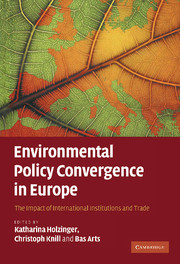Book contents
- Frontmatter
- Contents
- List of figures
- List of tables
- List of contributors
- Preface
- List of abbreviations
- 1 Introduction
- 2 State of the art – conceptualising environmental policy convergence
- 3 Theoretical framework: causal factors and convergence expectations
- 4 Research design, variables and data
- 5 Degree and direction of environmental policy convergence: analysis of aggregate data
- 6 The pair approach: what causes convergence of environmental policies?
- 7 The gap approach: what affects the direction of environmental policy convergence?
- 8 Conclusion
- Annex
- References
- Index
7 - The gap approach: what affects the direction of environmental policy convergence?
Published online by Cambridge University Press: 22 September 2009
- Frontmatter
- Contents
- List of figures
- List of tables
- List of contributors
- Preface
- List of abbreviations
- 1 Introduction
- 2 State of the art – conceptualising environmental policy convergence
- 3 Theoretical framework: causal factors and convergence expectations
- 4 Research design, variables and data
- 5 Degree and direction of environmental policy convergence: analysis of aggregate data
- 6 The pair approach: what causes convergence of environmental policies?
- 7 The gap approach: what affects the direction of environmental policy convergence?
- 8 Conclusion
- Annex
- References
- Index
Summary
INTRODUCTION
This chapter deals with the following sub‐set of questions of the research project:
What is the direction of policy convergence; i.e., does convergence coincide with an upward (‘race‐to‐the‐top’) or downward trend (‘race‐to‐the‐bottom’)?
What institutional and economic factors (as well as other potentially relevant variables) can explain upward or downward patterns of environmental policy convergence?
To what extent do our empirical findings vary across different policy dimensions (presence‐of‐policies and policy settings) as well as across various policy types (trade‐related versus non‐trade‐related policies and obligatory versus non‐obligatory standards)?
Theoretically, this chapter builds upon delta‐convergence, dealing with convergence towards an exemplary model (Heichel, Pape and Sommerer 2005). Methodologically, this chapter builds on the so‐called gap approach, based on an assessment of the gaps between individual country policies on the one hand and a certain policy benchmark – for example the best practice available – on the other, over different points in time. An average policy gap change in the direction of the benchmark then points at delta‐convergence as well as at a ‘race‐to‐the‐top’, provided that the benchmark is the best practice.
This approach is complementary to the ‘classical’ ones as well as to the pair approach. On the basis of aggregate descriptive data and the concept of sigma‐convergence, the ‘classical’ approach (chapter 5) primarily dealt with the degree of convergence. By calculating changes in the regulatory mean, furthermore, an idea of the direction of convergence could be given.
- Type
- Chapter
- Information
- Environmental Policy Convergence in EuropeThe Impact of International Institutions and Trade, pp. 196 - 226Publisher: Cambridge University PressPrint publication year: 2008
- 4
- Cited by



